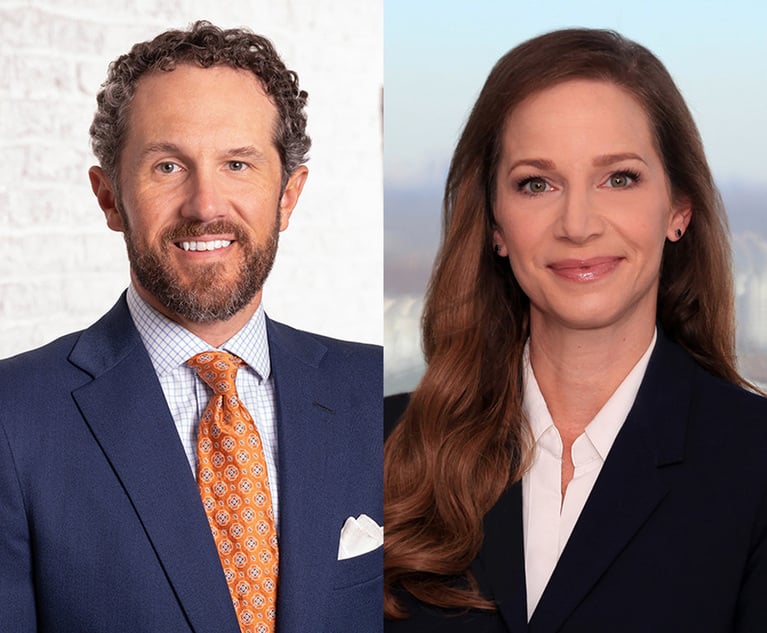Prominent Dallas Attorney Appeals Sanction Over 'Push Poll' to Texas Supreme Court
After two courts slammed him for using what amounted to a “push poll” to sway a jury pool in a wrongful death case, prominent Dallas attorney William…
May 14, 2018 at 03:45 PM
4 minute read

After two courts slammed him for using what amounted to a “push poll” to sway a jury pool in a wrongful death case, prominent Dallas attorney William Brewer III has appealed a $177,000 sanction award against him to the Texas Supreme Court by arguing he didn't violate any ethics rules or act in bad faith.
Brewer was sanctioned in 2016 by 72nd District Court Judge Ruben Reyes of Lubbock, who found the lawyer engaged in an abusive litigation tactic when he commissioned a poll over issues in a case in which Brewer was defending Titeflex, a company accused of manufacturing faulty flexible gas tubing that allegedly caused a deadly house fire.
The practice of conducting a poll aimed at shaping, rather than measuring, opinion is colloquially called “push-polling.”
Brewer, of Brewer Attorneys & Counselors, approved of poll questions that were “designed to influence or alter their opinions or attitude of the person being polled,” Reyes ruled. And the pollster Brewer hired to conduct the survey eventually contacted witnesses and parties involved in the Titeflex litigation to ask them the questions, according to the ruling. Reyes even found his own name on the pollster's database call list.
Brewer has long maintained that that he did nothing wrong and that his “jury focus exercise” was ethical, and that no state law, rule or court decision prevents lawyers from commissioning jury surveys. Brewer also “expressed sincere regret for the unforeseen, inadvertent contact made with certain people related to the case.”
But Reyes was unimpressed with Brewer's explanation and even less so with the live testimony he gave during a sanctions hearing, noting that the attorney appeared “nonchalant and uncaring” about his actions.
“The court finds Mr. Brewer's actions were not merely a negligent act, a mistake or the result of poor judgment, and Mr. Brewer's explanation that he bears clean hands because the poll was a blind study conducted by a third party vendor is insulting to the court,” Reyes wrote in his ruling sanctioning Brewer.
Brewer appealed the sanction, but Amarillo's Seventh Court of Appeals shot him down in March, agreeing with Reyes that the lawyer should be sanctioned.
“Brewer contends that the absence of express authority directly prohibiting this conduct operates as implied permission to conduct such surveys. This is a logical fallacy,” wrote Justice Patrick Pirtle, noting that trial courts have the inherent power to sanction lawyers whose abusive conduct affects a core function of the judiciary.
In his appeal to the Texas Supreme Court, Brewer argues that he acted ethically and was zealously representing his client by commissioning a pretrial survey to determine the prejudice the defendant faced—a litigation tactic no ethics rule prevents.
Brewer's appeal also faults the lower courts for failing to address the substance of the pretrial survey, which he argues was not a “push poll” but instead asked balanced questions to gauge public interest in his client's case. He also argues that he did not act in bad faith.
“Instead of addressing the survey's substance, the courts below seemed content to award sanctions based on Brewer's purportedly 'nonchalant' attitude (while being cross-examined by five separate attorneys) at the sanctions hearing. But a purported bad attitude is not bad faith, especially where the bad-faith inquiry here depends on Brewer's state of mind when the survey was commissioned—not months later at the hearing,” Brewer argues in the appeal.
“Indeed, there is no nexus between Brewer's demeanor at the hearing and the purported basis for the sanction—the survey,” the appeal states. “Although it may be easier to sanction an unpopular lawyer, a sanctions award contrary to the rule of law and controlling precedent cannot stand.”
“The record shows no bad faith and no interference with a core judicial function, thus requiring that the judgment be reversed and rendered in Brewer's favor,” Brewer's appeal states. “The court should grant the petition for review to correct these errors, to provide guidance on how Texas attorneys can test trial themes and arguments, and to clarify what standards apply so other courts do no mistakenly sanction attorneys for proper zealous advocacy.”
Brewer did not return a call for comment about the appeal.
Michael J. Collins, a partner at Brewer, Attorneys & Counselors, said: “There is nothing our firm takes more seriously than its ethical obligations. We have great respect for the courts below, but respectfully disagree with their findings, which were unsupported by any citation to the record. We believe that Mr. Brewer and our firm acted appropriately at all times.”
This content has been archived. It is available through our partners, LexisNexis® and Bloomberg Law.
To view this content, please continue to their sites.
Not a Lexis Subscriber?
Subscribe Now
Not a Bloomberg Law Subscriber?
Subscribe Now
NOT FOR REPRINT
© 2025 ALM Global, LLC, All Rights Reserved. Request academic re-use from www.copyright.com. All other uses, submit a request to [email protected]. For more information visit Asset & Logo Licensing.
You Might Like
View All
Overtime Rewind: Texas Court Ruling Unravels FLSA Salary Level Increases
4 minute read
Divided 5th Circuit Shoots Down Nasdaq Diversity Rules

Uvalde Shooting 'Fresh in Everyone's Mind:' Lone Dissenting Judge Disagrees with School's Disciplinary Decision Over Pellet Gun

Amazon, SpaceX Press Constitutional Challenges to NLRB at 5th Circuit
Trending Stories
- 1Restoring Trust in the Courts Starts in New York
- 2'Pull Back the Curtain': Ex-NFL Players Seek Discovery in Lawsuit Over League's Disability Plan
- 3Tensions Run High at Final Hearing Before Manhattan Congestion Pricing Takes Effect
- 4Improper Removal to Fed. Court Leads to $100K Bill for Blue Cross Blue Shield
- 5Michael Halpern, Beloved Key West Attorney, Dies at 72
Who Got The Work
Michael G. Bongiorno, Andrew Scott Dulberg and Elizabeth E. Driscoll from Wilmer Cutler Pickering Hale and Dorr have stepped in to represent Symbotic Inc., an A.I.-enabled technology platform that focuses on increasing supply chain efficiency, and other defendants in a pending shareholder derivative lawsuit. The case, filed Oct. 2 in Massachusetts District Court by the Brown Law Firm on behalf of Stephen Austen, accuses certain officers and directors of misleading investors in regard to Symbotic's potential for margin growth by failing to disclose that the company was not equipped to timely deploy its systems or manage expenses through project delays. The case, assigned to U.S. District Judge Nathaniel M. Gorton, is 1:24-cv-12522, Austen v. Cohen et al.
Who Got The Work
Edmund Polubinski and Marie Killmond of Davis Polk & Wardwell have entered appearances for data platform software development company MongoDB and other defendants in a pending shareholder derivative lawsuit. The action, filed Oct. 7 in New York Southern District Court by the Brown Law Firm, accuses the company's directors and/or officers of falsely expressing confidence in the company’s restructuring of its sales incentive plan and downplaying the severity of decreases in its upfront commitments. The case is 1:24-cv-07594, Roy v. Ittycheria et al.
Who Got The Work
Amy O. Bruchs and Kurt F. Ellison of Michael Best & Friedrich have entered appearances for Epic Systems Corp. in a pending employment discrimination lawsuit. The suit was filed Sept. 7 in Wisconsin Western District Court by Levine Eisberner LLC and Siri & Glimstad on behalf of a project manager who claims that he was wrongfully terminated after applying for a religious exemption to the defendant's COVID-19 vaccine mandate. The case, assigned to U.S. Magistrate Judge Anita Marie Boor, is 3:24-cv-00630, Secker, Nathan v. Epic Systems Corporation.
Who Got The Work
David X. Sullivan, Thomas J. Finn and Gregory A. Hall from McCarter & English have entered appearances for Sunrun Installation Services in a pending civil rights lawsuit. The complaint was filed Sept. 4 in Connecticut District Court by attorney Robert M. Berke on behalf of former employee George Edward Steins, who was arrested and charged with employing an unregistered home improvement salesperson. The complaint alleges that had Sunrun informed the Connecticut Department of Consumer Protection that the plaintiff's employment had ended in 2017 and that he no longer held Sunrun's home improvement contractor license, he would not have been hit with charges, which were dismissed in May 2024. The case, assigned to U.S. District Judge Jeffrey A. Meyer, is 3:24-cv-01423, Steins v. Sunrun, Inc. et al.
Who Got The Work
Greenberg Traurig shareholder Joshua L. Raskin has entered an appearance for boohoo.com UK Ltd. in a pending patent infringement lawsuit. The suit, filed Sept. 3 in Texas Eastern District Court by Rozier Hardt McDonough on behalf of Alto Dynamics, asserts five patents related to an online shopping platform. The case, assigned to U.S. District Judge Rodney Gilstrap, is 2:24-cv-00719, Alto Dynamics, LLC v. boohoo.com UK Limited.
Featured Firms
Law Offices of Gary Martin Hays & Associates, P.C.
(470) 294-1674
Law Offices of Mark E. Salomone
(857) 444-6468
Smith & Hassler
(713) 739-1250






